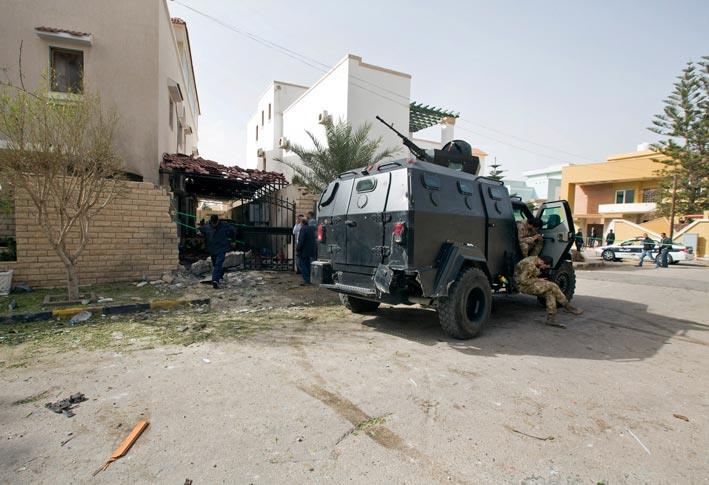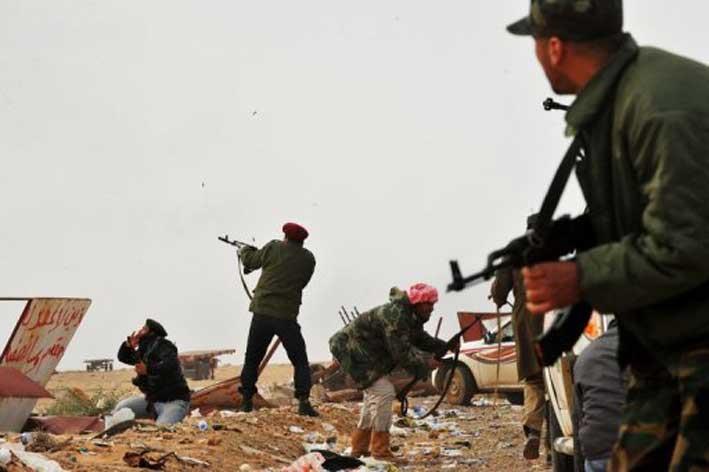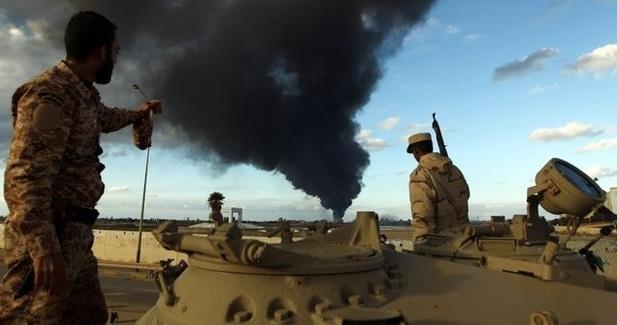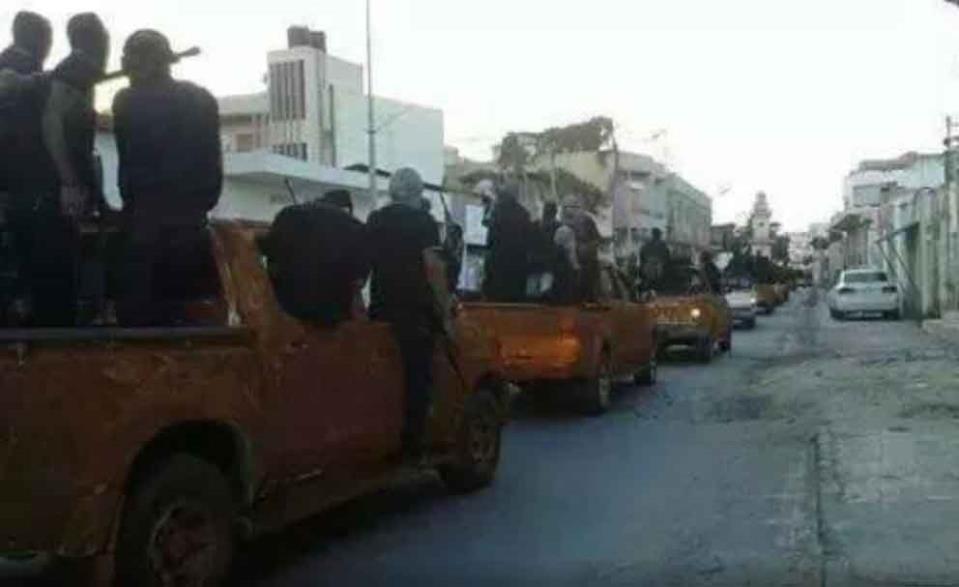Libyan humanitarian Tarek Tarhouni believes there are many misconceptions about Islamic State’s involvement in Libya. He also believes the terrorist group is unable to follow through with its threats to unleash half a million migrants at Europe or invading Malta or Italy. Mr Tarhouni also tells Neil Camilleri that the Maltese government should open a communication channel with the Tripoli government, which is currently not recognised by Malta and many Western states.
Even though a number of Islamist groups control large swathes of Libya the presence of ISIS in the country is not as strong as people make it out to be, according to Tarek Tarhouni, a Libyan humanitarian.
“Not every black flag belongs to ISIS. Black flags represent Ismalist groups in general.”
Mr Tarhouni says, however, that ISIS and other groups should not be underestimated. They have found a perfect breeding ground in the chaos and anarchy gripping Libya. He acknowledges that the much feared terrorist group has declared a caliphate in the city of Derna, which sits on the shore of the Mediterranean but believes that, contrary to reports, ISIS has not taken over Sirte. “I do not believe that ISIS is in Sirte. That is Ansar al-Sharia, another Islamist group.”

Mr Tarhouni also says ISIS in Libya is not the same ISIS of Iraq and Syria. He explains that the Middle East extremist group came about as a reaction to the persecution of Sunnis by Shias. In Libya the situation is different. There is no religious divide – the population is 99% Sunni.
“I personally do not believe that ISIS exists in the magnitude that people in Malta and in the West make it out to be. What we have in Libya are other Islamic fundamentalists factions, but not exactly ISIS.” He says, however, that when all of Libya’s extremist groups are put in the same basket one can understand how the West’s conclusions that ISIS is taking over the country came about.
Giving Libyans more weapons not the answer
“In the absence of law and order these groups will flourish. We need help with removing these groups and restoring law and order. What we need is police and army, and to starve these people (Islamists) from weapons.”
The availability of weapons is a big problem, as is interference from outside. “Before giving Libyans more weapons to fight ISIS we need to ask ourselves whether ISIS is such a big threat,” he says, on the calls to lift the arms embargo on Libya. “I believe that we should starve all factions of weapons, although some might agree that the best plan is to arm the militias further and let them eliminate each other.”

ISIS not capable of invading
Mr Tarhouni says Libyans are, generally speaking, ordinary citizens who want to enjoy their freedoms. “Libyans are weary of these different Islamist groups - from the Muslim Brotherhood to Ansar al-Sharia. When you go to Tripoli you find normal citizens who want stability and freedom. They do not want anyone to impose a will on them, whether Islamic or otherwise. Islamists in Libya are in a minority and we want the rule of democracy to prevail. If they are elected, then so be it. If not, they are not wanted.”
The expansion of territories by ISIS or other Islamist groups is not a concern for Libyans, he says. “Libyans are scared of car bombs and assassinations – the result of an internal power struggle – and not ISIS.” He also argues that the threat of ISIS invading Malta and the rest of Europe is unrealistic. “No one can exclude a terrorist attack but a full-scale invasion is not a reality. It would be more likely if fighting between Libyan factions spilled over to Malta. That is a possibility and Malta should be on the lookout, but ISIS sending an invasion force to Malta is not.”
He understands why Christians are scared. “I would be scared if I was a Christian living in Libya at the moment but you have to understand that the way ISIS does things – the beheadings on the beach – are not something that Libyans can accept or tolerate. He points out, however, that some have cast doubts over the video’s authenticity and hopes that the clip, whether real or not, is not used as an excuse to attack or invade Libya like what has been done in the past in countries like Iraq.

ISIS and the migrant threat
Mr Tarhouni is also highly sceptical about the Islamic State’s threat to unleash half a million migrants at Italy if that country chooses to attack them. “If you are talking about 20,000 or 30,000 migrants it could happen but not half a million. The numbers are impossible. There are not so many migrants in Libya. We have heard this threat before and it never materialised.”
So why has no one ever taken action to stop this illegal practice? “Illegal? In Libya” says Mr Tarhouni, with half a smile. “Who cares about illegal when you have a country in anarchy? Libyans have a million problems that are more important to them. That is the reality. Politicians are too busy to worry about Europe. The Tobruk and Tripoli government are up to their neck in problems to worry about migration.”
Mr Tarhouni points out two things: firstly the fact that the Tobruk government, the sole Libyan authority recognised by Malta, does not control the stretch of coast used by human traffickers. Secondly, the Tripoli government, which is being given the cold shoulder by Malta, may choose not to help for the sole reason that it is being ignored. “I call on the Maltese government to keep an open channel of communication with both sides.”

A country in chaos
Tarek Tarhouni says that to say that Libya is in chaos is a fair assessment of the situation. “This chaos is partly self-inflicted, partly inflicted by outside interference. Various factions are taking advantage of this state of anarchy. There is also a question of greed. There has been a lot of money going round the country and there are people who want this anarchy to continue. They are prolonging Libya’s recovery.”
Despite having two different governments – one in Tripoli and one in Tobruk – Libya does not have an effective administration. “Neither Prime Minister can move around freely in Libya. These are not governments as you know them. There are no effective cabinet structures. It is more a case of incompetent individuals doing as they please. I have lost confidence in both governments.”
He says, however, that the Maltese government should engage with both sides. “I have to point out that the majority of Maltese interests in Libya are in the west, which is under Tripoli’s control. Malta should look ahead and remain neutral instead of taking sides. The Maltese government – both current and previous – helped Libya a lot by assisting the Libyan cause. I think they should have stuck to the task of helping people rather than going into the merits of which government is recognized and which one is not.”

Freedom of expression taken to extremes
Mr Tarhouni was also asked about current conditions in Libya, particularly in Tripoli. “The fighting has subsided but we have a shortage of food and medicines. There is so much corruption. Items like flour, rice and semolina were in shortage last month and for the first time in Libya there were queues at bakeries. The ports are functioning, there is no restriction on importation but the goods are not reaching the people. I believe they are being stolen and find their way in neighbouring countries illegally to be sold. This is a result of greed.”
Life under the rule of Libyan Dawn, or the Islamist New General Congress in Tripoli, has improved slightly, he says. “Immediately after the ‘airport war’ ended things got better and people started staying out longer at night.”
People now have freedom of speech but that particular freedom is being abused and taken to extremes. “One of our biggest problems is the broadcasting stations, TV especially. There are many of them, broadcasting propaganda and acting very irresponsibly. They glorify their point of view and criminalise others. They have a huge part of the blame about what is happening in Libya.”
The only real solution for Libya is to hold real democratic elections to form a government representing the whole country. This would include politicians from both Tripoli and Tobruk. According to Mr Tarhoni, this is yet another reason why Malta should not engage exclusively with Tobruk.

Libya needs help
Both governments have so far proved themselves incapable of running the country but neither side seems to be willing to accept a full-scale military intervention. “It is partly a matter of pride, and the fact that they still think they can sort this mess out by themselves. We should give dialogue a chance, with the hopes of a future united government. If we ask for help we should do it as one nation. Otherwise it will not work.”
Tarek Tarhouni says three months ago he believed Libya did not need outside help. He has changed his mind. “We do need help. It is difficult to say what kind of intervention is needed because we cannot even quantify the problems that we have. Without help could we solve our problems within, say, two or three years? I am not that optimistic.”
Mr Tarhouni also concedes that the West and Libyans do not have the same priorities. While the West is preoccupied by the ISIS threat, the real problem for Libyans is the power struggle gripping the country. “There might be further complications since the extremist problem is mainly in the East, so it’s not really Tripoli’s problem. For them the fight is between the west and the east. The conflict is not Islamic. I know from experience, from the fighters that we have treated in Malta. These people are not strict Muslims.”

The revolution was a gamble
So was Libya better with Gaddafi in power? “No, Gaddafi’s Libya was a disaster compared to the country’s potential. We are now suffering the result of 42 years of Gaddafi rule. He did threaten with the anarchy. He brought a lot of weapons into the country, deprived people from education and health services. Libya did not even have an annual budget. Look at the state the country’s infrastructure was in. Gaddafi used to blame the West and its sanctions but they are not the ones to blame.
Today you cannot find people to reason with, we have drug and alcohol abuse. Add to the mix of lack of education and culture and the weapons available, it is a recipe for disaster. However, if the guns fell into the right hands it would not be a problem.”
So did the revolution fail? “We all took part in the revolution to improve our country. We took a gamble. We did not really realise that after four years we would still be in this situation. We knew it would take time but we did not foresee that people would take advantage of the situation the way they are doing andwe did not anticipate all this foreign interference.”
Malta should stick to helping people, not governments
Mr Tarhouni says Libyans will always be grateful to Malta for helping them in their time of need. “The help was very much appreciated, even if it was symbolic, like the lifeline to Misurata. There is even a sort of romantic edge to it and we would like to keep it at that rather than going into political issues and creating enemies out of nothing or trying to please all sides. We would like Malta to keep acting within its strengths, which is to assist the Libyan people rather than the Libyan governments. Governments come and go, people will remember.”